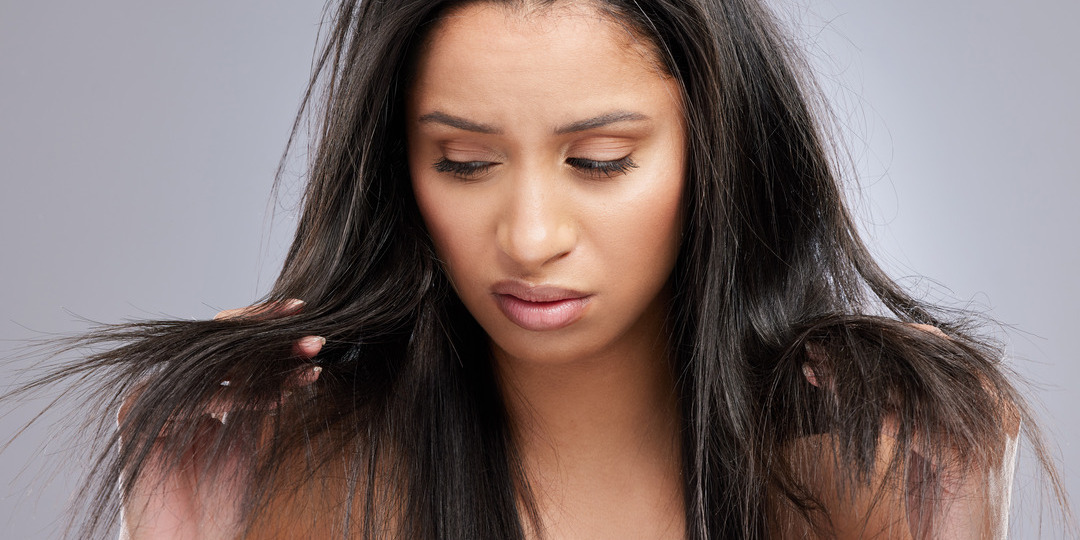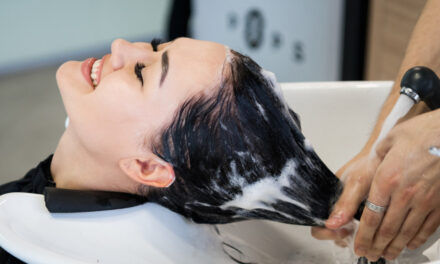
Hair breakage is a common problem for many people. It can be caused by a variety of factors, including excessive heat styling, chemical treatments like bleaching and dyeing, environmental damage (such as UV rays and pollution), poor nutrition, illness or medical conditions, certain medications, hormones, genetics, age and even stress.
Fortunately, there are ways to prevent it from happening and keep your hair looking healthy.
What is Hair Breakage?
Hair breakage occurs when the hair shaft, or strand of hair, splits and breaks off from the root. This can result in weak, brittle strands that are susceptible to further damage. Hair breakage is often characterized by split ends, thinning hair, dullness and frizziness.
What Does it Look Like?
Hair breakage can manifest itself in a variety of ways. You may notice that your hair growth is more prone to tangling, or that it looks limp and lacks shine. It’s also common for split ends to be present and for the hair to have a dry, brittle texture.
Characteristics of a Hair Breakage
If you see any of these signs in your hair, it’s likely that you are experiencing some degree of hair damage:
- Dry hair
- Brittle hair texture
- Split ends or frayed ends
- Tangling easily
- Lack of shine or luster
Causes Of Hair Breakage
In this section, we will explore the usual causes of hair breakage:
1. Over-styling
Heat styling tools like flat irons and curling wands, as well as chemical treatments like bleaching or dyeing, can cause damage to the hair shaft leading to breakage. It’s important to limit the use of these tools and products, as well as make sure that you are using them correctly.
2. Chemical treatments
Chemical treatments like perms, relaxers and dyes can cause damage to the hair shaft if not used properly. These treatments should only be done by professionals, and the instructions should always be followed precisely.
3. Excessive brushing or combing
Brushing or combing your hair when it’s wet can cause damage to the cuticle, leading to breakage. It’s best to wait until your hair is dry before brushing or combing it. Additionally, you should use a wide-toothed comb and brush with soft bristles.
4. Tight hairstyles
Tight hairstyles like braids or ponytails can put stress on the hair shaft, leading to breakage. If you do wear tight styles, make sure to let your hair rest between styles and use protective styles like silk or satin wraps to protect your hair at night.
5. Environmental factors
UV rays, pollution and other environmental factors can negatively affect the health of your hair. It’s important to protect your hair from these elements by using protective sprays, hats, and other products.
6. Poor nutrition and dehydration
Nutrition and hydration are key for healthy hair. Make sure you’re eating a balanced diet and drinking enough water to keep your scalp and hair healthy.
7. Hormonal changes
Hormonal changes during pregnancy, menopause and other times can lead to hair breakage. These changes are natural and should be discussed with your doctor.
8. Certain medications or medical conditions
Certain medications and illnesses can also lead to hair breakage. If you are suffering from a condition or taking any medication that can affect your hair, it’s important to talk to your doctor about the best way to protect and maintain its health.
9. Genetics
Genetics can also play a role in hair breakage. If you have curly hair, for example, it’s more prone to breakage because of the shape of the hair shaft. Additionally, people with fine hair or thinner hair tend to be more susceptible to breakage as well.
10. Using harsh hair products
Using harsh shampoos or conditioners can strip the hair of its natural oils, leaving it dry and prone to breakage. It’s important to use products that are specifically designed for your hair type and to avoid those with harsh sulfates or parabens.
11. Over-washing or under-washing your hair
Washing your hair too often can also strip it of its natural oils, leading to dryness and breakage. On the other hand, not washing your hair enough can cause the scalp to become clogged with dirt and debris, leading to breakage.
12. Wearing hats or helmets that rub against the scalp causing friction and damage
Wearing hats or helmets that rub against the scalp can damage the cuticles of your hair and lead to breakage. Make sure you are wearing a hat or helmet that fits comfortably and doesn’t put too much pressure on your scalp. Additionally, you should avoid putting the same hat or helmet on your head each day.
13. Towel Drying
When trying to dry your hair, it is important to remember that rubbing wet hair with a towel can cause irreparable harm. Hair strands become more fragile and brittle when wet, increasing the chances of frizz and breakage. To avoid this problem altogether, try squeezing out excess water from your damp locks rather than vigorously wiping them down with a cloth.
Instead of rubbing your hair, try a gentler approach such as wrapping it with a towel to absorb the moisture or simply allowing your hair air dry.
7 Hair Breakage Treatment Tips

Listed here are some hair breakage treatments that may help you restore your hair’s health and vitality:
1. Use a moisturizing shampoo and conditioner
Using a moisturizing shampoo and conditioner can help restore moisture to your hair and reduce breakage. Look for formulas that are specifically designed for dry or damaged hair.
2. Avoid using heated styling tools
Heated styling tools can further damage hair that’s already fragile. If you must use them, be sure to use a heat protectant spray and avoid using high temperatures.
3. Use a wide-toothed comb and brush with soft bristles
Wide-toothed combs and brushes with soft bristles can help you detangle hair without causing breakage. Start at the ends of your hair and work your way up towards the roots.
4. Limit the use of tight hairstyles
Tight hairstyles such as braids, ponytails and buns can cause pulling and tension at the scalp which can lead to breakage. Try to limit tight styles and switch them up with looser looks instead.
5. Incorporate protective styles
Protective styles such as hats, scarves and braids can help keep your hair away from the elements while also reducing breakage.
6. Use natural oils to nourish your hair
Natural oils such as coconut oil, almond oil, argan oil and jojoba oil can help restore moisture to dry or damaged hair. Massage the oil into your scalp and hair to help protect it from breakage.
7. Eat a balanced diet
Eating a healthy, balanced diet with plenty of fruits and vegetables can help give your hair the nutrients it needs to stay strong and prevent breakage.
8 Hacks to Prevent Hair Breakage from Coming Back

These steps and tips can help you get rid or stop hair breakage and prevent it from coming back!
1. Shampoo and conditioner specifically designed for your hair type
2. A wide-toothed comb or brush with soft bristles
3. A deep conditioning mask or leave-in conditioner whether you have thin or thick hair for extra hydration
4. Hair oils and hair serums to help nourish and protect the hair
5. A heat-protecting spray to shield the hair from heat damage
6. Hair ties made of silk or other soft materials
8. Hair masks for thin and thick hair specifically designed for split ends and breakage
When to See a Medical Expert
If your hair breakage is persistent, it’s important to consult with a doctor or dermatologist. Your doctor may be able to diagnose an underlying medical condition that is causing the breakage.
They may also recommend specific products or treatments to help prevent further damage. Additionally, a doctor may be able to suggest lifestyle changes such as dietary adjustments or stress management techniques that can reduce the amount of hair loss you experience.
Caring for your hair properly with the right products and practices can help prevent and reduce hair breakage. With a little patience and the right techniques, you can enjoy healthier, shinier locks in no time!
Outlook
Hair breakage can be a frustrating and even alarming problem for many people. However, the good news is that there are many steps you can take to prevent it from happening and to stop it in its tracks if it does occur. By understanding the causes of hair breakage, you can adjust your habits and routines to better protect your hair from damage.
Some of the most effective ways to prevent hair breakage include reducing heat styling and chemical treatments, using gentler hair accessories, protecting your hair from harsh weather conditions, eating a balanced diet rich in vitamins and minerals, and managing stress levels. Additionally, treating your hair with deep conditioning treatments regularly and trimming split ends can also help keep breakage at bay.
If you do experience hair breakage despite these preventative measures, there are still steps you can take to address it. Massaging the scalp to improve circulation, avoiding hot water while washing your hair, and trying natural remedies like coconut oil or aloe vera can all help repair damaged hair fibers.
By taking care of your hair and being mindful of the factors that contribute to breakage, you may visit Vitamins Revive to find the best solutions for your hair problems. With a little effort, you can restore your locks to their former glory and enjoy healthy, strong hair once again!
FAQs
Is it possible to reverse hair breakage?
Yes, it is possible to reverse the effects of hair breakage. Treating your hair with deep conditioning treatments, wearing protective styles, avoiding hot water and chemical treatments, and eating a balanced diet can all help bring damaged strands back to life.
Can stress really cause hair breakage?
Yes, stress can contribute to hair breakage as it can lead to hormonal changes that affect the health of your hair. Managing stress levels through practices like meditation or exercise can help prevent this.
How often should I trim my hair to prevent breakage?
It’s generally recommended to trim your hair every 6-8 weeks to prevent split ends from traveling up the shaft and causing more damage.
Are natural remedies really effective for preventing hair breakage?
While there is no one-size-fits-all solution for preventing or treating hair breakage, many natural remedies like coconut oil or aloe vera have been shown to improve the overall health of your strands. It’s worth experimenting with different remedies to see what works best for you.
What is the best shampoo for hair breakage?
The best shampoo for hair breakage will depend on your specific needs and concerns. Look for a sulfate-free, low pH shampoo that is specifically designed to nourish and repair damaged strands. Additionally, you may want to consider using a deep conditioning treatment in addition to your regular shampoo.










